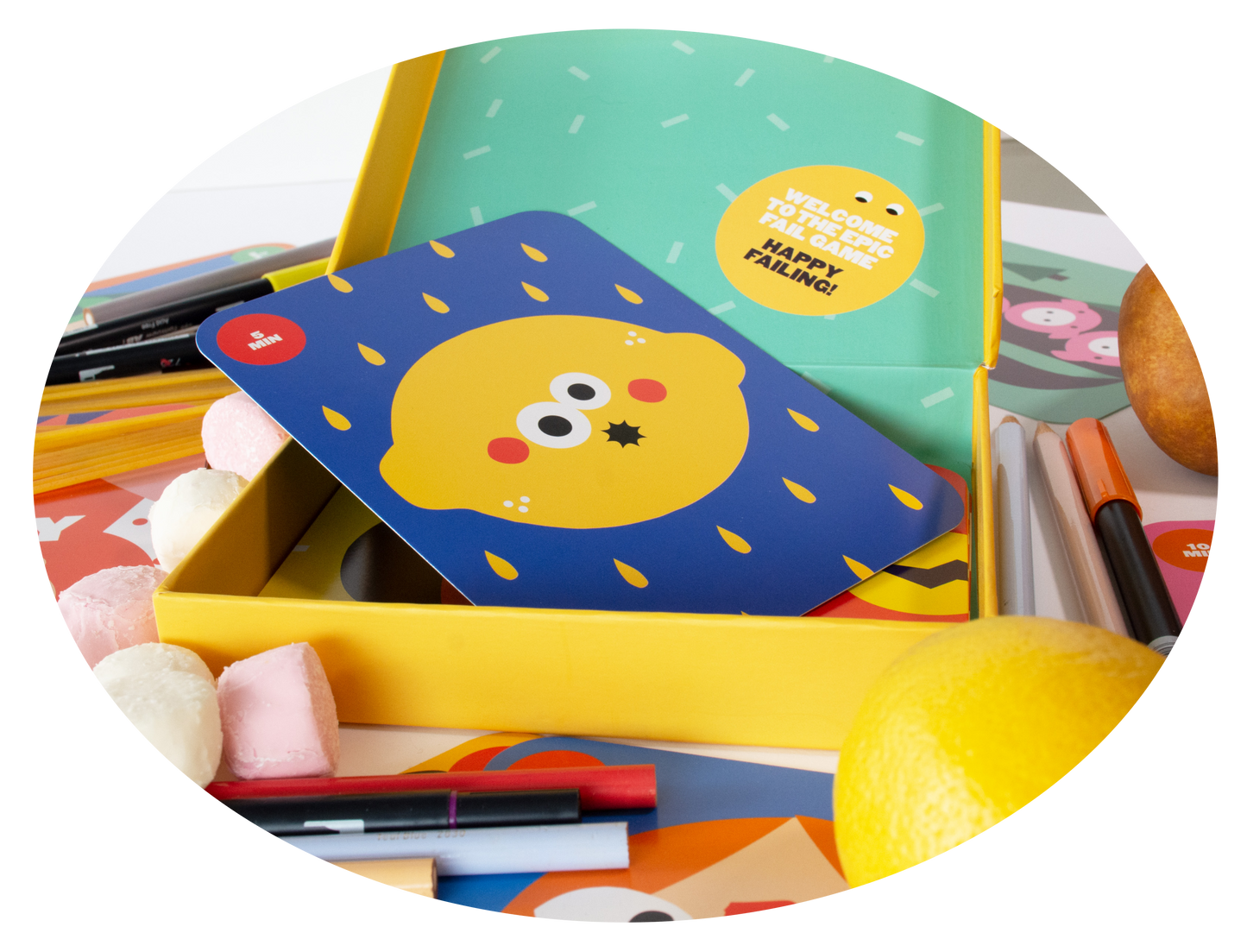
Celebrating Failure through play
What is The Epic Fail Game?
A set of 30 challenge cards designed to change the way the whole family thinks about failing!
There is no limit to the number of players or time needed. Play for hours on a Sunday afternoon or sneak a quick few challenges before bed time.

All we need is love (of fails)
Why The Epic Fail Game?
Because it's never been harder to be a kid! Statistics the world over are showing a huge rise of anxiety in children. The causes are mixed and many. Everything from helicopter parenting, lack of play, technology overload, too much sugar and too little sleep are competing for the blame.
One thing's for sure: We need to grow more resilience - which usually means bracing for some hard knocks. But that doesn't have to come at the expense of fun. In fact, wouldn't it be amazing if we redefined those bumps, knocks and fails as something positive?

EPIC FAILS IN 1, 2. 3!
How to Play
1. Place ALL the cards picture-side up. Some of the challenges might call for extra tools* but don't worry if you don't have them, just pick a different card and carry on.
2. Take turns choosing one card to read out loud.
3. EVERYONE completes the challenge at the same time! Once the challenge is complete, the next player chooses a card and so on and on and on.
*Some of the extra things you might need include: raw spaghetti, marshmallows, pens, paper, and lemons.
The Epic Fail Game
Share



A METHOD TO THE MADNESS
The Epic Fail Game Theory
The Epic Fail Game design was informed by the latest brain and behaviour research and anchored in cognitive behaviour therapy (CBT) methods. This is fancy term that describes a field of psychology that believes your reality (to a reasonable extent) is framed by your mindset, and that if you can change the way think about something, you can change the way you feel about it. This goes as far as actually changing the way your brain is wired and reprogramming your automatic physical responses to things like anxiety and fear. Read more about some of the concepts forming the foundations of our game here...

It takes a village to raise a child!
This timeless adage reminds us of the power of community and connection in shaping a child’s sense of self. Interacting with a mix of people—through both fun and frustration!—helps us all find our place in the world.
But today, despite growing online connectivity we’re all feeling more isolated than ever. That’s why our games are designed to be real-world, social, and open to players of all abilities, ages, and group sizes. Let’s embrace the chaos, get messy and re-connect withour villages

You need to find your edges...
IN THE ‘OLDEN DAYS’... of not-too-long-ago, children would find their limits on the playground, in their neighbourhoods and their communities. They’d explore their physical environment by climbing trees, riding bicycles or maybe even operating heavy machinery – training their bodies to explore their physical limitations. Social skills were tested in a similar way, sharpening negotiation skills (or risk spending more time on their own). We love the idea that we develop our skills by discovering the edges of our abilities—or even the patience of others. After all, how can we push past our limits if we don’t first find out where they lie?

Our brains are like plasticine
Our brains are wonderfully elastic, capable of learning and adapting, but they also take the easy way out. Developing new skills takes effort and repetition—practising something over and over until it becomes second nature.
Some of our games and challenges
might feel tricky at first, but trust the process. Stick with it, and those new skills will take shape before you know it!

Growing up never gets old
Psychologist Carol Dweck’s theory of ‘growth mindset’ shows that the way we view our abilities can shape how we learn. Those with a fixed mindset believe their talents are set—they’re either good at maths, creative, or not. Meanwhile, people with a growth mindset see skills as things that can be developed.
Dweck found that believing you can
improve makes you more likely to study, practise, and succeed. That’s why we focus on incremental improvement—because practice makes progress!

The Power of reframing our stories
Have you noticed how you feel differently before, during, and after an experience? For example, jumping into cold water feels shocking at the moment, but later, you remember it as amazing.
Psychologists like Daniel Kahneman call this the difference between our "experiencing self" and "memory self." The way we remember events—happy, sad, or scary—depends on the story we tell ourselves afterward. That’s why we focus on the stories we tell ourselves and look for opportunities to reframe situations in our memories, shaping how we approach the future.

The future is fast
The world of work is changing rapidly—65% of kids in primary school today will likely work in jobs that don’t yet exist (thanks, World Economic Forum!).
This means rethinking how we prepare kids for an unknown future. Educators are embracing new approaches like STEM and STEAM, but important lessons happen outside the classroom too. Big businesses are already embracing “fail fast” methods and teamwork over individual achievement.
Our toys and tools focus on skills like experimentation and collaboration, building the creative abilities most relevant for future jobs.
-
The Epic Fail Game
Regular price $39.95 AUDRegular priceUnit price / per -
You Got This Cards
Regular price $29.95 AUDRegular priceUnit price / per -
Make Play Grow
Regular price $39.95 AUDRegular priceUnit price / per




